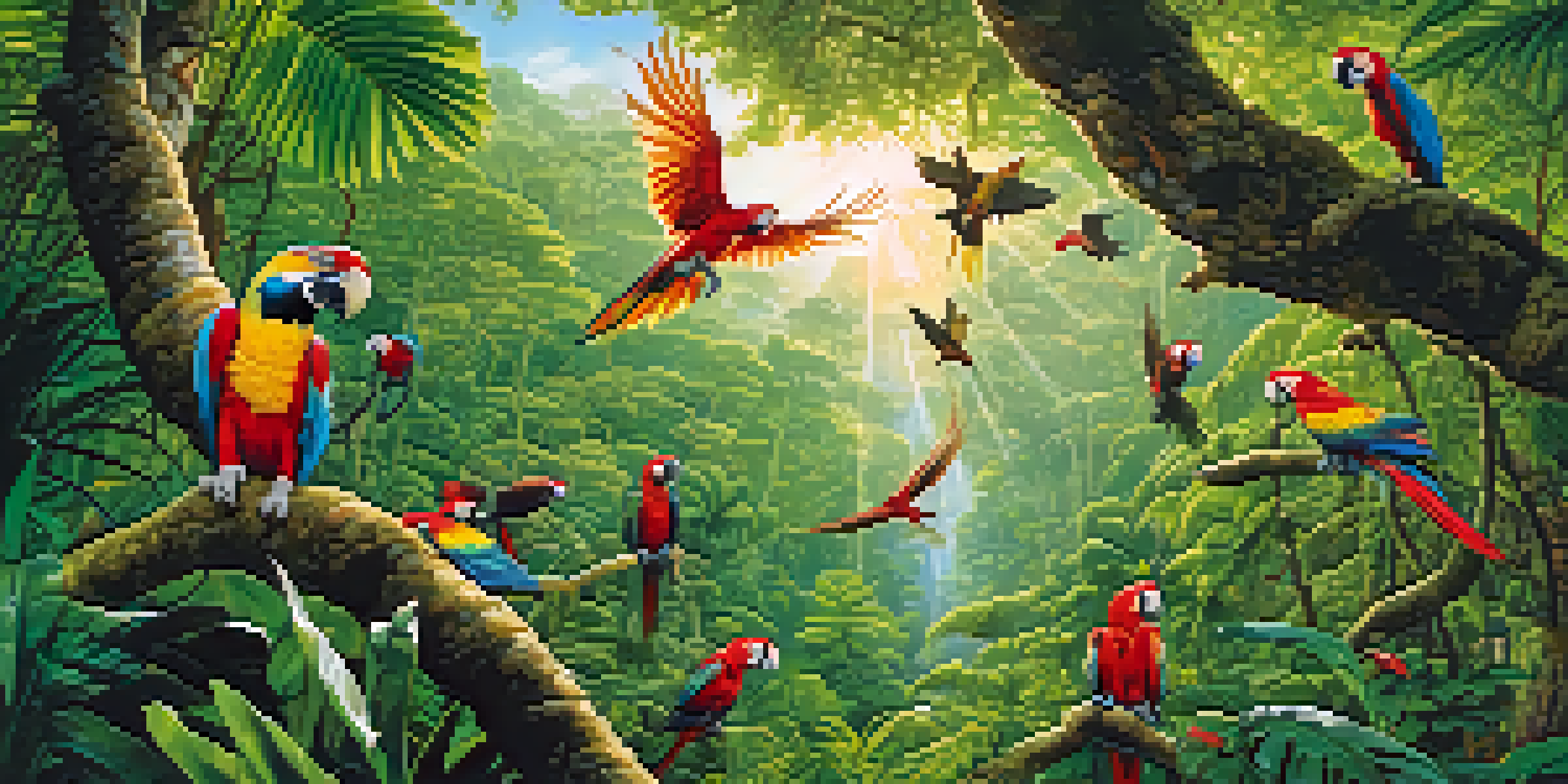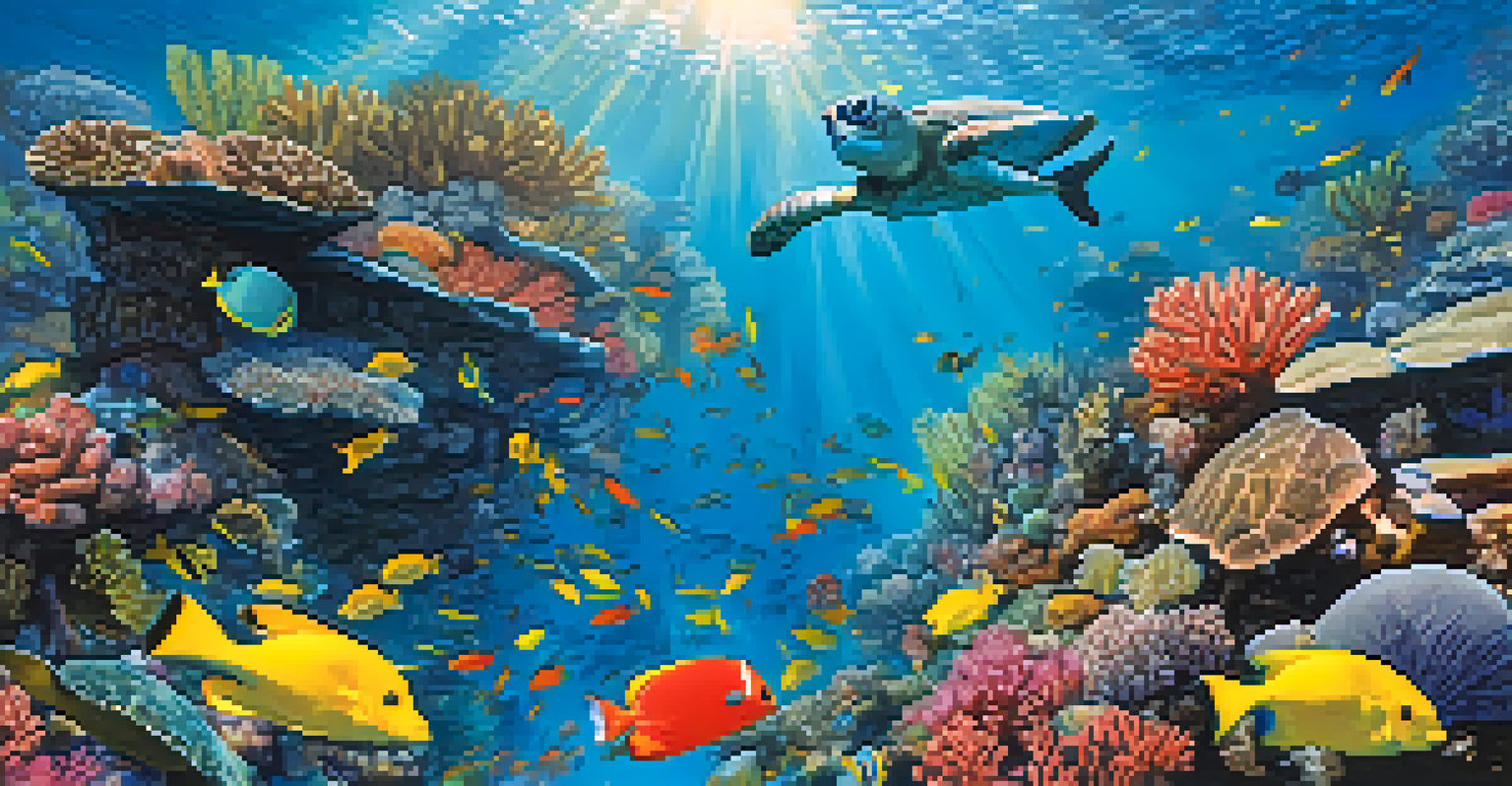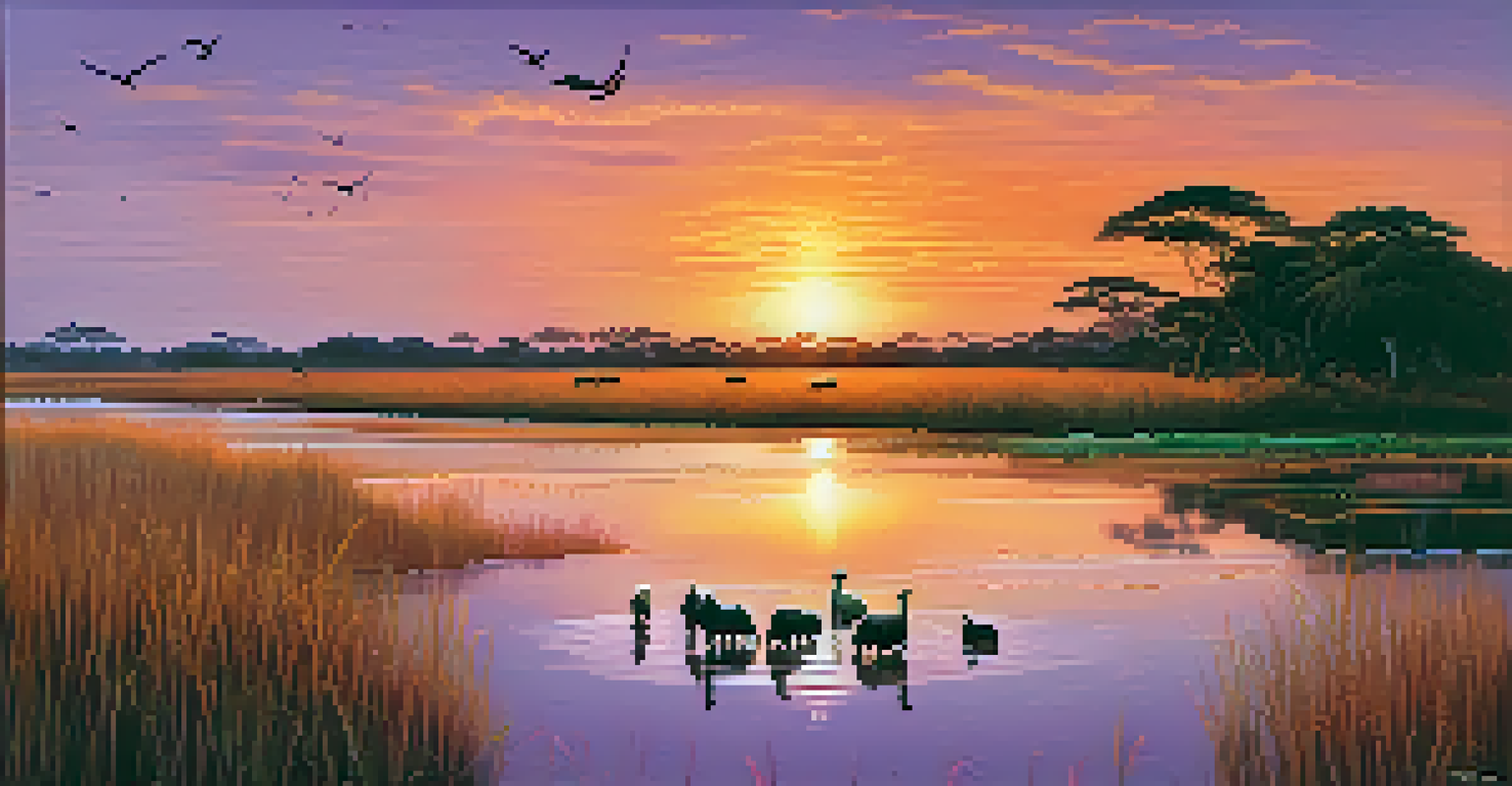The Impact of Climate Change on Brazil's Wildlife Diversity

Understanding Brazil's Unique Wildlife Diversity
Brazil is home to an astonishing variety of wildlife, including over 10% of the world's known species. From the vibrant Amazon rainforest to the unique Pantanal wetlands, the country boasts ecosystems that are incredibly rich and diverse. This diversity is not just beautiful; it plays a crucial role in maintaining ecological balance and supporting local human communities.
The greatest threat to our planet is the belief that someone else will save it.
However, this treasure trove of biodiversity is under threat, primarily due to climate change. As temperatures rise and weather patterns shift, species are finding it increasingly difficult to adapt to their changing environments. The intricate web of life that has evolved over millennia is now at risk, and the consequences could be profound.
With climate change affecting habitats, food sources, and migration patterns, many species are facing the possibility of extinction. This loss of wildlife not only impacts the ecosystem but also affects the livelihoods of people who depend on these resources, illustrating the urgent need for conservation efforts.
The Role of the Amazon Rainforest in Biodiversity
The Amazon rainforest is often referred to as the 'lungs of the Earth' due to its role in absorbing carbon dioxide and producing oxygen. This vast ecosystem is not only vital for global climate regulation but also serves as a habitat for countless species. However, climate change poses a significant threat to this critical area, leading to forest degradation and loss of biodiversity.

Rising temperatures and altered rainfall patterns are causing shifts in plant and animal populations, disrupting the delicate balance of the rainforest. Species that rely on specific conditions may find their habitats shrinking or disappearing entirely. For instance, animals like the jaguar and the Amazon river dolphin are increasingly at risk as their environments change.
Biodiversity Threatened by Climate Change
Brazil's rich wildlife diversity is at risk due to the impacts of climate change, which threaten habitats and species survival.
Moreover, the loss of biodiversity in the Amazon has far-reaching implications beyond Brazil's borders. It affects global climate patterns, contributes to greenhouse gas emissions, and reduces the resilience of ecosystems worldwide. Protecting the Amazon is not only crucial for Brazil's wildlife but for the health of the entire planet.
Threats to Coastal and Marine Biodiversity
Brazil's coastal and marine ecosystems are equally impacted by climate change. Rising sea levels, ocean acidification, and increased water temperatures threaten various species, from coral reefs to coastal mangroves. These environments are crucial for many marine species' life cycles and serve as essential buffers against storms and erosion.
In every walk with nature, one receives far more than he seeks.
For example, coral reefs, which are home to a diverse range of marine life, are suffering from bleaching events due to warmer waters. This not only affects the fish that rely on reefs for shelter but also the communities that depend on fishing for their livelihoods. The loss of these ecosystems can lead to a decline in fish populations and disrupt local economies.
Furthermore, coastal habitats like mangroves are vital for carbon sequestration and protecting inland areas from flooding. As they diminish due to rising sea levels and increased storm intensity, both wildlife and human populations face greater risks. The protection of these coastal ecosystems is essential for maintaining biodiversity and ensuring the survival of local communities.
Impact on Endangered Species in Brazil
Brazil is home to many endangered species, including the golden lion tamarin and the hyacinth macaw. Climate change exacerbates the challenges these species already face from habitat loss and human encroachment. As their environments change, these animals find it increasingly difficult to find food, mates, and suitable habitats.
For instance, the golden lion tamarin relies on specific forest conditions to thrive. As climate change alters these conditions, their populations may decline further, pushing them closer to extinction. Conservation efforts must take these changes into account to develop effective strategies for protecting these vulnerable species.
Importance of Conservation Efforts
Conservation initiatives in Brazil are crucial for protecting wildlife and supporting local communities in the face of environmental challenges.
The plight of endangered species highlights the interconnectedness of all life on Earth. Protecting these animals is not just about saving a species; it’s about preserving the entire ecosystem they inhabit. By focusing on their needs, we can create broader conservation strategies that benefit all wildlife in Brazil.
The Importance of Conservation Efforts
In light of climate change's impact on wildlife diversity, conservation efforts in Brazil are more vital than ever. Organizations and governments are working together to create protected areas and promote sustainable practices. These initiatives aim to safeguard habitats, reduce human-wildlife conflict, and support local communities in conservation efforts.
One successful example is the creation of protected areas in the Amazon, which helps to maintain biodiversity by preserving habitats. Additionally, community-based conservation programs empower local residents to engage in sustainable practices that benefit both wildlife and their livelihoods. This holistic approach is essential for fostering a sense of ownership and responsibility among communities.
Moreover, raising awareness about the importance of wildlife diversity can lead to increased support for conservation initiatives. Educating the public and engaging them in conservation efforts can create a ripple effect, encouraging more people to take action in the fight against climate change and its impact on Brazil's wildlife.
The Role of Ecotourism in Wildlife Protection
Ecotourism has emerged as a powerful tool for promoting wildlife conservation in Brazil. By attracting visitors to natural areas, ecotourism generates revenue that can be reinvested into conservation efforts. This not only helps to protect wildlife but also supports local economies, creating a win-win situation for both nature and communities.
For example, many eco-lodges and tours are designed to minimize environmental impact while providing visitors with unique experiences. This encourages the preservation of natural habitats and raises awareness about the importance of biodiversity. Tourists often leave with a deeper understanding of the challenges facing wildlife, inspiring them to advocate for conservation efforts.
Ecotourism Benefits Wildlife Protection
Ecotourism in Brazil provides economic benefits while promoting awareness and funding for wildlife conservation efforts.
However, it's essential that ecotourism is managed sustainably to prevent negative impacts on wildlife. Striking the right balance between tourism and conservation ensures that wildlife can thrive while still providing economic benefits. Responsible ecotourism can play a significant role in safeguarding Brazil's rich biodiversity for future generations.
Future Outlook: Challenges and Opportunities
As climate change continues to pose challenges for Brazil's wildlife diversity, the future outlook remains uncertain. However, there are opportunities for innovative solutions that can help mitigate these impacts. By investing in research, technology, and community engagement, Brazil can develop strategies to protect its unique ecosystems.
Collaboration between government, NGOs, and local communities is crucial for creating effective conservation policies. By leveraging the knowledge and expertise of various stakeholders, Brazil can address the complex challenges posed by climate change. This collaborative approach can lead to more resilient ecosystems and better outcomes for wildlife.

Ultimately, the commitment to protecting Brazil's wildlife diversity is a shared responsibility. By raising awareness and fostering a culture of conservation, we can work together to ensure that future generations inherit a rich and diverse natural heritage. The time to act is now, as the clock is ticking for many species at risk.